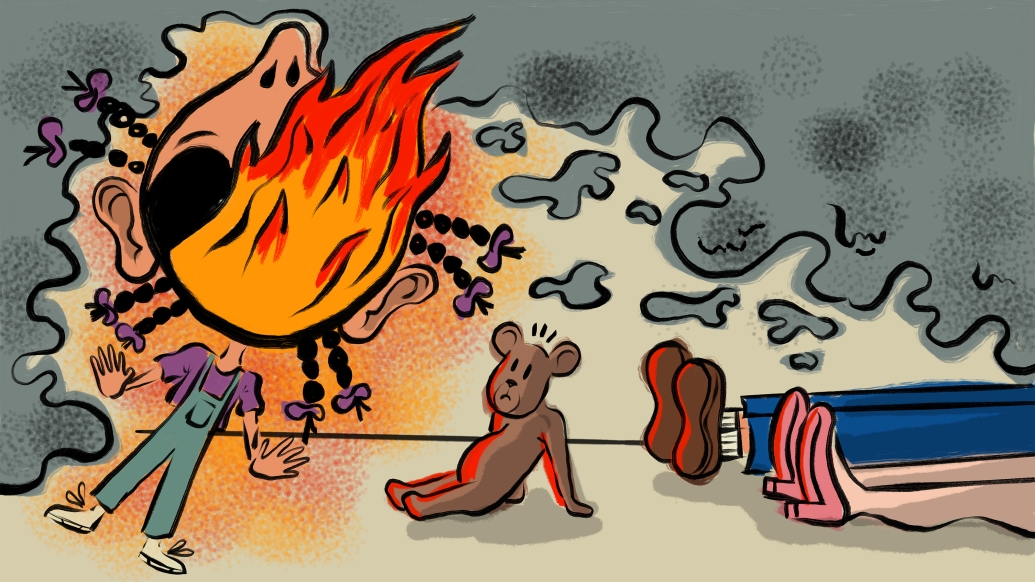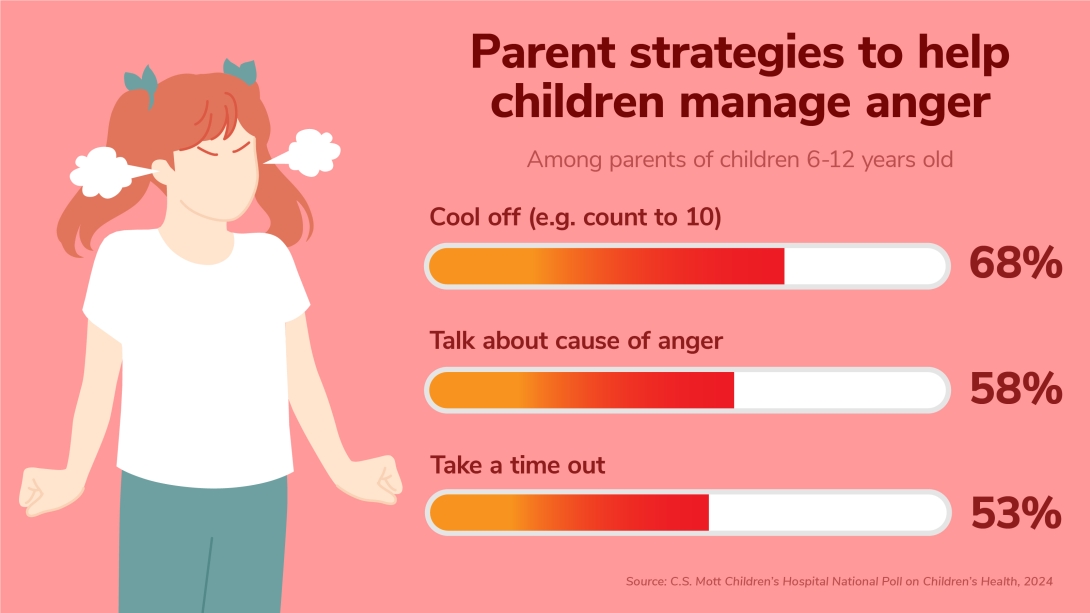Expert offers strategies to help kids manage intense emotions as many parents report setting a bad example for anger management, worrying their child’s anger will cause problems
5:00 AM
Author |

Many parents are all too familiar with angry outbursts from their children – from sibling squabbles to protests over screen time limits.
But some parents may find it challenging to help their kids manage intense emotions.
One in seven think their child gets angrier than peers of the same age and four in 10 say their child has experienced negative consequences when angry, a national poll suggests.
Seven in 10 parents even think they sometimes set a bad example of handling anger themselves, according to the University of Michigan Health C.S. Mott Children’s Hospital National Poll on Children’s Health.
"Children often react intensely to minor frustrations since they’re still building emotional regulation skills. Without guidance on how to express these feelings appropriately, it can lead to disruptive behaviors, problems at school, and strained relationships,” said Mott Poll co-director Sarah Clark, M.P.H.
“Parents play an important role in teaching children how to process and manage their anger productively. But some parents may need guidance themselves on the best strategies to do this.”
The nationally representative report is based on 1,031 responses from parents of children ages 6-12 surveyed in August 2024.
Some children express anger more often
While more than a third of parents feel their child has gotten better at managing anger, 12% worry that their child’s anger will cause problems for them.
More parents of boys than girls say that in the past year their child has experienced negative consequences when angry, including hurting themselves or others, having problems with friends, or getting in trouble at school.
Fourteen percent of parents also think their child gets angry more often than same-aged peers – and these parents are more likely to feel that they could be modelling bad anger management, worry that their child’s anger will cause problems, and report their child has experienced negative reactions when angry.

“Children who feel or express emotions strongly may feel different from others, and if they are shamed for their anger, it could make it much worse,” Clark said.
“It’s important for parents to let children know that getting angry does not make them a bad person and that they just need to learn to manage it."
But parents may not always use effective strategies through these challenges, with one in three parents saying they haven’t received advice about helping children learn anger management.
And although more than three fifths of parents report their child’s school has teachers or counselors who help children learn to manage their anger, less than half say the school provides information for parents on this topic.
More findings from the report plus six strategies to help children process anger more effectively:
Help children identify go-to calming tools
Parents polled endorsed a variety of strategies to help their child deal with anger or frustration.
These strategies include cool-off activities like drawing, counting to ten or deep breathing, thinking about something happy to keep calm, meditation or mindfulness or moving away from other people.
Some children also benefit from a physical outlet for their anger, like ripping paper or squeezing a stress ball – which more parents of boys encouraged than parent of girls.
Others may just need an opportunity to vent and be heard.
“For many children, effective strategies involve taking some type of break from the momentary frustration, allowing the opportunity to calm down and regain control,” Clark said.
“There’s no magic strategy that works for every child so it’s helpful for parents to seek out different sources of information and advice and try different approaches.”
Recognize what’s behind the anger
Most parents polled recognize their role in helping prevent angry outbursts.
To help their child avoid getting angry or frustrated, parents say they often try to ensure they get enough sleep and exercise, help identify and avoid triggers and avoiding overscheduling.
Children often react intensely to minor frustrations since they’re still building emotional regulation skills. Without guidance on how to express these feelings appropriately, it can lead to disruptive behaviors, problems at school, and strained relationships.”
- Sarah Clark, M.P.H.
Children's anger also often stems from feelings of fear or disappointment that they lack the skills to express calmly.
“Anger is often a secondary emotion or a response to underlying feelings,” Clark said.
“Understanding this may help adults approach situations with empathy and patience.”
Model calm responses to anger
Most parents polled acknowledged they sometimes set a bad example on managing anger.
By acknowledging their feelings and apologizing, parents can demonstrate effective anger management strategies for their children to use when they get too angry, Clark says.
Adults may consider narrating their self-soothing techniques, such as saying, “I’m feeling frustrated, so I’m going to take a deep breath.”
“Just as it’s natural for children to experience anger, adults do too,” Clark said.
“When parents feel they’ve set a bad example, they have a valuable opportunity to turn the situation into a teachable moment.”
Provide positive reinforcement
Clark recommends encouragement when parents notice children handling their anger constructively.
Specific praise, such as “that’s great that you took deep breaths instead of yelling,” reinforces use of coping tools.
“Rewarding children for successfully managing a frustrating situation can send a positive message,” she said.
“However, punishing a child for getting angry or frustrated will be ineffective unless parents emphasize the importance of using strategies to manage their frustration. “Some children have temperaments that make them more prone to frustration, leading to quicker and more intense reactions.”
While it’s important to validate feelings, she says, parents should also set clear boundaries on aggressive behavior like hurting others or breaking things.
Take a pulse on children’s anger management at school
Children may face different challenges and frustrations at school than at home, Clark notes.
“At school, children have less control. They’re around peers, don’t have their own space, are forced to follow someone else’s schedule, and they can’t avoid things that make them upset,” Clark said.
“It’s important for parents to understand how their children express emotions in this environment outside of home.”
She recommends parents use school conferences to ask how their child handles day-to-day frustrations and inform teachers about strategies that work best at home but could be adapted for the school setting.
Seek professional help if needed
If a child’s anger becomes severe, frequent, or unmanageable, it may be helpful to consult a therapist or counselor.
Children experiencing underlying issues, such as anxiety, trauma, or learning challenges, may have more difficulty managing anger, Clark says.
Professional support can provide them with tailored strategies and support families in managing these behaviors effectively.
Sign up for Health Lab newsletters today. Get medical tips from top experts and learn about new scientific discoveries every week.
Sign up for the Health Lab Podcast. Add us wherever you listen to your favorite shows.

Explore a variety of health care news & stories by visiting the Health Lab home page for more articles.

Department of Communication at Michigan Medicine

Research Scientist
Want top health & research news weekly? Sign up for Health Lab’s newsletters today!




